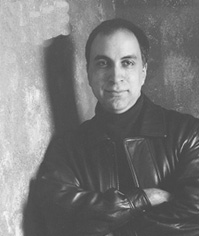
Composer Anthony Cornicello (born in Brooklyn, New York, 1964) writes music that blurs distinctions between performers and electronics, timbre and harmony, composition and improvisation, and explores the boundaries of what may be considered post-classical concert music. His music is vibrant and visceral, full of rhythmic energy and harmonic sophistication, and his forays into live electronics have led to exciting combinations of instruments and processed sound. Cornicello’s background as a jazz pianist is evident not only in the rhythmic activity of his music, but also in his constant investigation of the rich sonorities available from a variety of instruments.
He has been commissioned to write music for the Scorchio Electric String Quartet, ModernWorks! (funding from Meet the Composer/ Commissioning Music USA), the Auros Group for New Music, the Prism Saxophone Quartet, the New York New Music Ensemble, David Holzman, the Group for Contemporary Music, and the InterEnsemble of Padova, Italy. His work has also been featured on the Guggenheim Museum’s “Works and Process” series. Cornicello’s works have also been performed by the Chicago Civic Symphony, Parnassus, ALEA III, Composers Concordance, Madeleine Shapiro, Robert Black, among many other outstanding groups and solo performers. His music has been presented as part of the Darmstadt International Festival of New Music as well as the June in Buffalo Festival.
Cornicello’s Second String Quartet has been recorded by the Atlantic String Quartet; the Second Sonata for Piano by David Holzman (Centaur). More recently, his Post-Modern Waltz was recorded by Eric Moe for Albany Records. A portrait CD of Cornicello’s works is scheduled for 2006 release on Albany Records.
As a performer, he has conducted or played piano in his own works on numerous occasions. While a graduate student at Rutgers, he formed and directed the Janus Ensemble, a group dedicated to contemporary music. More recently, Cornicello has begun performing on the laptop, using a variety of interfaces and the Max/MSP program. Those performances, mostly with EEE!, have had a notable impact on his music, as EEE!’s music ranges from hip-hop to experimental noise. EEE! is based at Eastern Connecticut State University, where Cornicello is an Associate Professor and Director of the Electronic Music Lab.
Cornicello received the Ph.D. from Brandeis University, where he studied with David Rakowski, Eric Chasalow, and Martin Boykan. His teachers also include Charles Wuorinen, Gérard Grisey, and Richard Beirach.
His current fields of interest include developing unusual interfaces for live computer music performances, as well as continuing to investigate resonance and spatialization. His recent and current projects (mostly for string instruments and electronics) have been exploring the latter two, and the series of experimental works ReZenant Garden, performed by EEE! have operated on all three areas of interest. Future projects will include works for instrumental groups or soloists and electronics, as well as turntablists.
Cornicello's works are published by C.F. Peters Corporation and APNM, and he is a member of BMI.
|
|
|
|
|
|

Saturday, November 03, 2007
Bailing, Bawling, and Buttstix
Bailing
Okay, a few weeks ago I loudly proclaimed how I was using Open Music to write this piece. And, for a while, I thought it would work. But, I wasn't happy with the results, so I've set that material aside. I do this every now and then: make an attempt at integrating Open Music with my compositional techniques, and then I retreat. I'm not sure why, but the results I get just don't often thrill me...
Bawling
Well, more like kicking and screaming. And I'm not talking about Sophia, although she has been known to do her share of that.
I was turned down, for the second time, for a Sabbatical. Generally speaking, I don't take rejection lightly. What's really infuriating about this, was my somewhat accidental discovery earlier in the week, of evidence that the voting that occurs on this committee is flawed. Without going into too much details, let's just say that out of the 12 Sabbaticals usually offered each year, it appears that many are, shall we say, already spoken for. When you look at the incredibly small number of Sabbaticals actually offered by my university, and then subtract the number of members on the committee, you realize that most of us are competing for 2-4 spots.
What's truly frustrating about this was that my proposal was quite good! Last year's proposal was kind of meager, and so I came up with good proposal, to do research on a book idea. Of course, I'm going to pursue the book; the big question is whether I should include this sentence in the acknowledgments:
"I would have liked to thank Eastern Connecticut State University for their support, but, alas, there was none."
A few personal agenda items: finding out how to properly bring the evidence I have to light, and stop it from happening again.
Also, on a somewhat related note: requisition a new garbage can. They don't make them like they used to.
Buttstix
If you don't know who David Rakowski is, go read this article in New Music Box. And, if you do know him, you should read the same article!
I studied with Davy when I was at Brandeis. I thought he was a good teacher - certainly a lot different than some older faculty members who insist that music should only be a certain way. Davy was, and apparently still is, open to new possibilities - and that's reflected in his music.
And, he's got a truly wacky sense of humor, as in the above-mentioned buttstix.
Look closely at his titles, by the way. Often, some odd Italian double-entendre - I sure, for instance, that he knows that Uccelli is also a slang for a certain body part....
There, I've done it - I've laughed, I've cried, and I've hurled, all in one blog post. "Good night Austin, Texas, wherever you are!"
posted by Anthony Cornicello
|
| |



